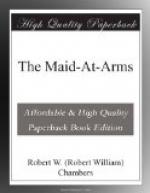“Let this end now!” he said, sternly. “Do officers of the Royal Greens conduct like yokels at a fair? Answer me, Captain Campbell! And you, Captain McDonald! Take your seat, sir; and if I hear that cursed word ‘Glencoe’ ’again, the first who utters it faces a court-martial!”
Partly sobered, the Campbell glared mutely at the McDonald; the latter also appeared to have recovered a portion of his senses and resumed his seat in silence, glowering at the empty glasses before him.
“Now be sensible, gentlemen,” said Colonel Claus, with a jovial nod to the patroon; “let pass, let pass. This is no time to raise the fiery cross in the hills. Gad, there’s a new pibroch to march to these days—
“Pibroch o’
Hirokoue!
Pibroch o’ Hirokonue!”
he hummed, deliberately, but nobody laughed, and the grave, pale faces of the women turned questioningly one to the other.
Enemies or allies, there was terror in the name of “Iroquois.” But Walter Butler looked up from his gloomy meditation and raised his glass with a ghastly laugh.
“I drink to our red allies,” he said, slowly drained his glass till but a color remained in it, then dipped his finger in the dregs and drew upon the white table-cloth a blood-red cross.
“There’s your clan-sign, you Campbells, you McDonalds,” he said, with a terrifying smile which none could misinterpret.
Then Sir George Covert said: “Sir William Johnson knew best. Had he lived, there had been no talk of the Iroquois as allies or as enemies.”
I said, looking straight at Walter Butler: “Can there be any serious talk of turning these wild beasts loose against the settlers of Tryon County?”
“Against rebels,” observed Sir John Johnson, coldly. “No loyal man need fear our Mohawks.”
A dead silence followed. Servants, clearing the round table of silver, flowers, cloth—all, save glasses and decanters—stepped noiselessly, and I knew the terror of the Iroquois name had sharpened their dull ears. Then came old Cato, tricked out in flame-colored plush, bearing the staff of major-domo; and the servants in their tarnished liveries marshalled behind him and filed out, leaving us seated before a bare table, with only our glasses and bottles to break the expanse of polished mahogany and soiled cloth.
Captain McDonald rose, lifted the steaming kettle from the hob, and set it on a great, blue tile, and the gentlemen mixed their spirits thoughtfully, or lighted long, clay pipes.
The patroon, wreathed in smoke, lay back in his great chair and rattled his toddy-stick for attention—an unnecessary noise, for all were watching him, and even Walter Butler’s gloomy gaze constantly reverted to that gross, red face, almost buried in thick tobacco-smoke, like the head of some intemperate and grotesquely swollen Jupiter crowned with clouds.
The plea of the patroon for neutrality in the war now sweeping towards the Mohawk Valley I had heard before. So, doubtless, had those present.




